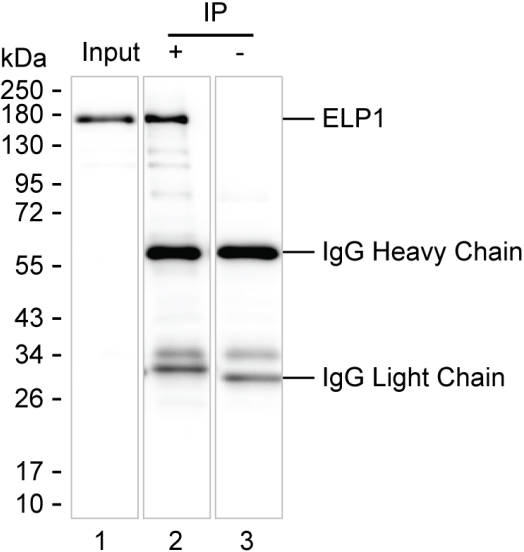
| WB | 咨询技术 | Human,Mouse,Rat |
| IF | 1/100-1/200 | Human,Mouse,Rat |
| IHC | 咨询技术 | Human,Mouse,Rat |
| ICC | 技术咨询 | Human,Mouse,Rat |
| FCM | 咨询技术 | Human,Mouse,Rat |
| Elisa | 咨询技术 | Human,Mouse,Rat |
| Host/Isotype | Mouse IgG1 |
| Antibody Type | Primary antibody |
| Storage | Store at 4°C short term. Aliquot and store at -20°C long term. Avoid freeze/thaw cycles. |
| Species Reactivity | Human |
| Immunogen | Purified recombinant fragment of human ELP1 |
| Formulation | Purified antibody in PBS with 0.05% sodium azide |
+ +
以下是3篇涉及ELP1抗体的代表性文献,供参考:
1. **文献名称**:*ELP1/IKAP loss in a familial dysautonomia mouse model impacts neuron survival through altered p53 signaling*
**作者**:Anderson SL, et al.
**摘要**:该研究利用ELP1抗体检测基因敲除小鼠模型中ELP1蛋白表达缺失对神经元凋亡的影响,发现ELP1缺失通过激活p53通路导致交感神经元死亡,为家族性自主神经失调症(FD)的病理机制提供新见解。
2. **文献名称**:*Tissue-specific reduction in splicing efficiency of IKBKAP due to the major FD mutation*
**作者**:Slaugenhaupt SA, et al.
**摘要**:通过ELP1抗体免疫印迹分析,揭示FD患者中ELP1基因IVS20+6T>C突变导致组织特异性剪接异常,进而降低神经组织中全长ELP1蛋白水平,解释该疾病的神经系统特异性表型。
3. **文献名称**:*The role of ELP1 in mRNA translation and neurodevelopmental disorders*
**作者**:Dietrich A, et al.
**摘要**:研究使用ELP1抗体进行免疫荧光定位,发现ELP1蛋白在神经元核质间动态分布,调控特定mRNA的翻译效率,其功能异常可能导致多种神经发育障碍,提示其作为治疗靶点的潜力。
注:ELP1(亦称IKAP)抗体常用于检测其在细胞中的表达定位及功能研究,以上文献均聚焦于ELP1在神经疾病中的分子机制。如需具体文章细节,建议通过PubMed或Google Scholar按标题检索。
The ELP1 antibody targets the ELP1 (Elongator Complex Protein 1) subunit of the Elongator complex, a highly conserved multi-protein assembly involved in transcriptional elongation, histone acetylation, and tRNA modification. ELP1. also known as IKAP (Inhibitor of κB kinase complex-associated protein), plays a critical role in regulating gene expression and cellular processes such as neurodevelopment, cell migration, and stress responses. Mutations in the *ELP1* gene are linked to familial dysautonomia (FD), a rare hereditary neuropathy, and have been implicated in cancer progression and neurological disorders.
ELP1 antibodies are widely used in research to study the protein's expression, localization, and functional interactions. They enable detection via techniques like Western blotting, immunohistochemistry, and immunofluorescence, aiding in investigations of Elongator complex dynamics, disease mechanisms, and potential therapeutic targets. Recent studies also explore ELP1's role in cytoskeletal organization and its crosstalk with signaling pathways like mTOR and MAPK.
As ELP1 dysfunction correlates with diverse pathologies, its antibody serves as a vital tool for dissecting molecular pathways in neurodegeneration, cancer biology, and developmental disorders, offering insights into disease biomarkers and intervention strategies.
×